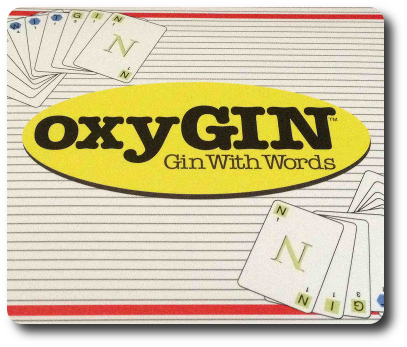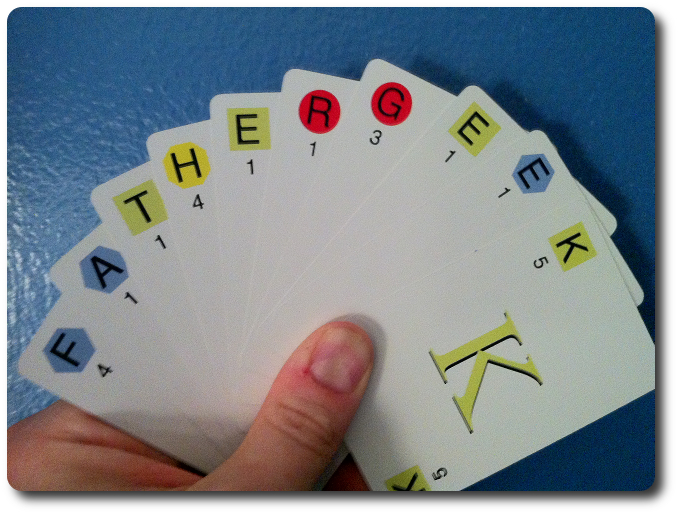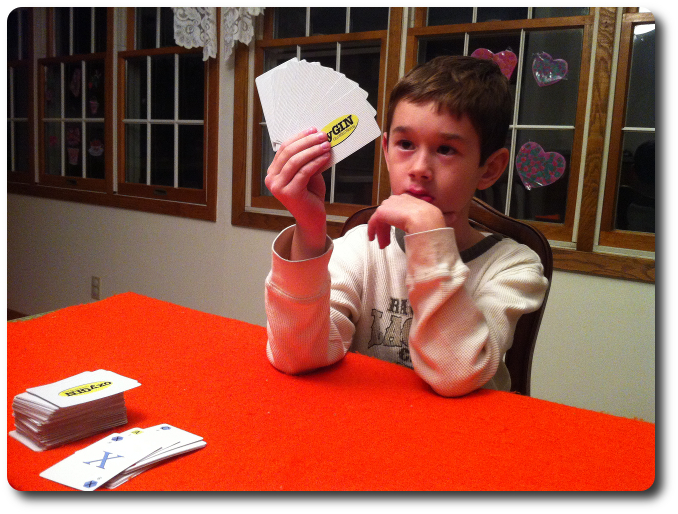
The Basics:
- For ages 8 and up
- For 2 to 4 players
- Approximately 30 minutes to complete
Geek Skills:
- Active Listening & Communication
- Counting & Math
- Reading
- Pattern/Color Matching
- Hand/Resource Management
Learning Curve:
- Child – Easy
- Adult – Easy
Theme & Narrative:
- None
Endorsements:
- Gamer Geek rejected!
- Parent Geek approved!
- Child Geek approved!
Overview
One of the many miraculous abilities of the human mind is to create order from chaos. We can take a 5000 piece puzzle and put it together, we can look at strings of numbers and determine a pattern, and we can look at a hand of cards with random letters to create words. It’s our ability to reason that has allowed us to go to the Moon, avoid being eaten by tigers, and to invent games we can play with the whole family.
OXYGIN, by OXYGIN LCC, is comprised of 152 Letter cards, 4 player reference cards, and 2 blank cards that can be used by the game’s owner to create cards of their own. The Letter cards have 4 different suits but each suit is a different shape (circle, square, hexagon, and octagon) making it easy for the colored blind player to identify them. Not included with the game, but necessary to play, is a pen or pencil and something to write on to keep track of the players’ points. You might also consider having a dictionary nearby to look up words.
Game Set Up
To set up the game, first give all 152 Letter cards a really good shuffle. I cannot emphasis this enough.
Second, deal out to each player 10 cards, face-down. The players can look at their cards, but should keep them hidden from their opponents at all times.
Third, place the rest of the deck face-down in the middle of the playing area and draw the top card. Place the top card face-up next to the draw deck to create the discard pile.
Fourth, hand to each player a player reference card.
That’s it for game set up. Let’s get to playing!

Hmmm…. Yes, I like where this is going!
Making Words, Scoring Points
The game is played in rounds with players taking multiple turns per round. The first player to begin the game is the player to the dealer’s left. A player’s turn is summarized here and is comprised of three steps. Once completed, the next player going clockwise has their turn, and so on. This continues until the endgame is triggered for the round.
Step 1: Take a Card
The player’s first action is to either take the top face-up card on the discard pile or the top card from the deck. The player must do one or the other, not both. This card is placed in the player’s hand.
Step 2: Discard
The player’s second action is to take a card from their hand and place it on the discard pile, face-up. The placed card can be the same one taken from the draw deck.
Step 3: Declare “Gin”
While steps 1 and 2 are mandatory, step 3 is only possible if specific conditions are met. If not, then the player’s turn is over after step 2 and step 3 is ignored at this time.
A player can only announce “Gin” if the following is true. If it is, the player places their hand down on the table to show all their cards.
- All the cards in the player’s hand are used to create words
- Each word must be at least 2 letters long
- The player’s hand can contain one or more words
- Words cannot be proper names or words that are usually capitalized
- Each word must be comprised of the same suit (all circles, for example)
The endgame is now triggered for the round.
Endgame for the Round…Possibly
As soon as a player declares “Gin”, the endgame for the round is triggered. Starting with the opponent to left of the player who triggered the endgame, each person now gets to challenge any word in the player’s hand in turn order sequence.
If the Word is Incorrect
If the challenged word is found to be incorrect, the player who is showing their hand is penalized a number of points equal to double the word’s total value and the opponent who successfully challenged the word gets the same number of points added to their score. The player’s hand is then picked up and play continues as normal. Furthermore, this player cannot declare “Gin” on their next turn.
A words value is determined by adding up the numbers on each of the Letter cards. For example, the letter “A” is worth 1 point and the letter “Q” is worth 10 points.
If the Word is Correct and the Hand is Complete
If the challenged word is found to be correct (usually requiring a quick look in a dictionary), the opponent who challenged the word is penalized a number of points equal to double the word’s total value.
All the other players now show their hand and can be challenged on any words they state are correct. Once every player has had a chance to be challenged, the final points for the round are counted. These points are in addition to any bonus points earned or lost during word challenges.
- All words are worth the total points of the numbers noted on the Letter cards they are comprised of.
- Any Letter cards not used have their number value count as negative points.
- The player with the longest word gets a bonus of 10 points for each letter their word is longer than the longest word created by one of their opponents. For example, if the player with the longest word used 6 letters and the next longest word was 4 letters, the player wold earn a total of 20 bonus points.
- The player who successfully declared “Gin” gets a bonus of 10 points.
All of these points are collected and then added or subtracted to the player’s current total score.
The round is now over. Unless a player has collected a sum that is equal to or higher than the target value to end and win the game, the player who declared “Gin” takes all the cards played in the round and sets them aside. The remaining deck is used to set up the game as noted above. If necessary, the previously played cards can be dealt back into the deck.
Winning the Game
The game continues until a set number of points are scored at the end of the round. While the points necessary to win can be modified (fewer points for a shorter game, more points for a longer game), the rules define a winner based on the number of players.
- 2-player game, first to 200 or more points wins
- 3-player game, first to 150 or more points wins
- 4-player game, first to 100 or more points wins
For more information on OXYGIN and to read the complete rules, visit the game’s web site.
Prediction
Up until a few years ago, games that would require spelling and reading were beyond everyone in my family except for my wife and I. My 8-year-old can now read like a champ and learns to spell new words everyday. My 5-year-old is just now getting to a point where he can recognize large words and can spell a growing number of simple 3 to 4-letter words. My 3-year-old can spell “OWL”, but our primary focus with him at the moment is potty training. So while OXYGIN is well out of reach for my 3-year-old, and most likely still a bit beyond my 5-year-old to play well, it should be just fine for my 8-year-old and any Child Geek who can spell and read at a Second Grade level.
I’m not suggesting the game will be fun, however. It the game starts to feel like “work”, or worse yet “homework”, it will fail to please the Child Geeks immensely. The Parent Geeks who enjoy card games and word games are sure to get a kick out of OXYGIN, especially if they attempt to leverage it as a family game that also strengthens spelling. Which it does and is. I’m not at all convinced that the game will please the Gamer Geeks, however. There is really nothing to the game that would suggest it had Gamer Geeks in mind. Which is perfectly fine, by the way.
Teaching the game doesn’t take much effort and the player reference cards have a large (but incomplete) number of 2-letter words to help everyone out. The trick is to make sure that all the players understand that the words they create must be comprised of the same suit. I put extra emphasis on this because I didn’t want the players creating words in their hand incorrectly. Nothing worse than a disgruntled gamer.
And so, after teaching the game to my little geek and answering the few questions he had (mostly focused on how points were counted), I shuffled the extremely large deck and asked him his thoughts on the game so far.
“Easy rules, but I think the real challenge will be racing you to shout “Gin” before I’m stuck with a lot of cards.” ~ Liam (age 8)
My son brings up an excellent point. This is, to a certain degree, a knowledge-based game. Any player who is a stronger reader and speller with a larger vocabulary will have a distinct advantage over a player who doesn’t. Of course, the randomized cards do somewhat trump any player’s vocabulary Kung-fu. Doesn’t matter how good a speller you are if you don’t have the letters.
Final Word
The game both pleased and frustrated the Child Geeks. They liked the race aspect of the game and quickly snatched up face-up cards that were needed to complete words. Good thing this game isn’t like Poker, because it was very easy to tell when a Child Geek was struggling to make words or confidently completed one. A lot of sighs and giddy laughter as words were created or remained elusive. When it came to collecting points, the Child Geeks did well and held their own. They were only competitive when playing against their peers, however. When playing against an adult, they always lost. We suggest you play teams (a Child Geek and a Parent Geeks share points) when playing with a mixed age group. This allows the younger players to play and be competitive in a cooperative team-play experience. Regardless of how many points they won, lost, or missed, the Child Geeks thought the game was interesting and endorsed it.

My little geek contemplates his cards as I take my turn
Parent Geeks, as predicted, liked OXYGIN if they enjoyed word games and thought that the game was an excellent way to strengthen spelling skills. Both for the adults and the kids. A number of times the Parent Geeks would suddenly have a blank look on their face as they started to second guess a word they were spelling. This wasn’t often, however, and happened as often as you would expect in a game like Scrabble. While the dictionary was nearby, we made a house rule that stated you couldn’t look up a word while playing. This kept the words the players’ spelled fairly simple and safe. After a few games, the Parent Geeks were satisfied that the game played well, kept their interest, was casual fun, and a wonderful way to trick the Child Geeks into practicing their letters, spelling, and words.
The Gamer Geeks didn’t care for OXYGIN. They recognized it very early on as a family focused game with very light depth and game play. Collect a card, use it, drop it, and shout “Gin” when you think you have won. That’s about it for the game from a Gamer Geek’s perspective. Not much there to get excited about. They did enjoy the challenge of trying to make words faster than their opponents and the Gamer Geeks took much more risk in attempting to create longer words. This was a type of game play not seen while playing OXYGIN with the Parent and Child Geeks. Consequently, the game scores were varied a great deal and the game felt much more exciting. Unfortunately, not exciting enough for the Gamer Geeks to endorse it.
The older I get, the more I appreciate games like OXYGIN that I can play at the family table that are not only entertaining and challenging, but also strengthen the very lessons my children are learning in school. It helps them to see how learning skills in the classroom can be used to do something fun once school is over. We spend a great deal of our time teaching children math, social studies, and vocabulary, but we don’t spend nearly enough time taking those lessons and showing them how they can be used to be creative and competitive. It’s easy to connect running fast in gym class with winning races, but not as easy to connect the immediate benefits of knowing how to do arithmetic. Board and card games are an excellent way to use those mental skills and exercise them using simple to complex game mechanisms. If a child can clearly see the benefits of such skills and have fun using them, maybe they’ll try a bit harder on their math test, take a bit more time with their spelling, and be all the better for it.
This game was given to Father Geek as a review copy. Father Geek was not paid, bribed, wined, dined, or threatened in vain hopes of influencing this review. Such is the statuesque and legendary integrity of Father Geek.

